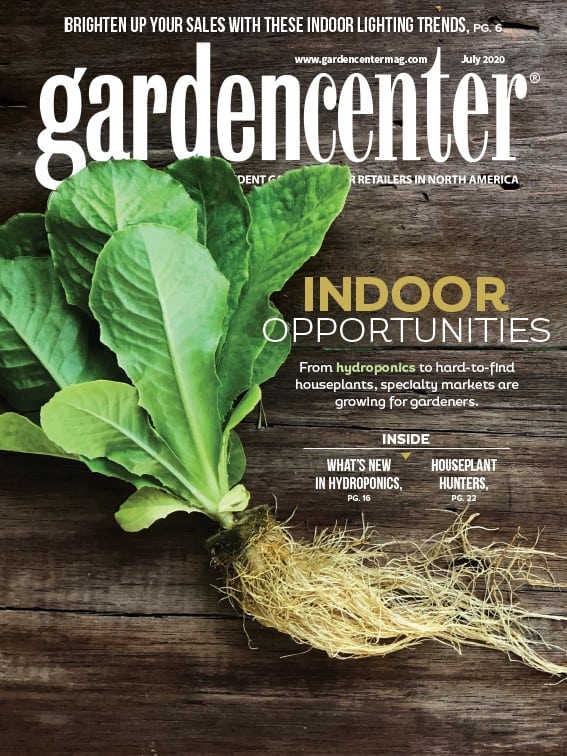

One of the positive reactions to the recent pandemic has been a huge upswing in the desire to grow vegetables. All spring garden centers have heard from customers who want to revive long abandoned vegetable plots, build new raised beds or turn lawn under in order to grow edibles. It is, as George Ball, chairman of the W. Atlee Burpee Company, said recently, the “green lining” of COVID-19.
IGCs hustled to supply their customers with vegetable plants early in the season and many saw sales of edible plants skyrocket. Now, our job is to help those with veggie gardens to be successful. If these customers have good results, they are likely to repeat these plantings or expand on them next year. For some, growing vegetables may even inspire further gardens and horticultural adventures. It’s in an IGC’s best interest to assist these new kitchen gardeners through the season, and there are several ways we can support such customers.
Keep them up to date
Everyone who grows vegetables knows that certain things need to be attended to at particular times. Experienced gardeners do these things automatically, which prevents small problems from getting larger. Yet those new to edibles often don’t notice situations until they get out of hand, so they need timely advice. Whether you develop an email list especially for new vegetable gardeners or publish up-to-date information on your social networks and newsletters, keep your customers apprised of typical problems in your region. For example, alert them if they need to spray organic fungicides to suppress mildew or tomato blights, when to apply Bt (Bacillus thuringiensis) or Spinosad for cabbage moth larvae control and how to fight common insects that attack vegetables in your area.
New gardeners also need prompting about when to pick their vegetables. Broccoli in home gardens often don’t grow as large as the ones found in supermarkets, and gardening newbies may not cut their heads because they’re waiting for them to get bigger. Similarly, many don’t know that beans need to be harvested every other day in order to keep the plants flowering and producing more beans. Simple reminders such as “It’s time to harvest garlic!” or “Pick your cucumbers before they get too fat; young cukes are sweet but older ones get tough and seedy,” are extremely helpful.
Weekly tips
Weekly tips about coping with critters, good watering practices and supporting heavy plants will be appreciated, whether your customers are new to vegetable gardening or not. An experienced vegetable gardener can lay out a month’s worth of guidelines that can be used in your newsletters, social media and signage.
Timely pointers can be combined with products in a store display that educates and promotes problem-solving merchandise. Create an “Incredible Edibles” section where you can post a weekly tip for success along with the fertilizers, soaker hoses, mulch and organic pesticides that gardeners will find helpful. Let your customers know that they’ll find suitable information and products in that space throughout the summer.


Edible happy hours
Using Zoom or other meeting and webinar platforms can be a great way to share information and generate excitement. I’ve found that the cocktail hour draws the most attendance. People are ready to relax at five o’clock, but they’re not so tired that they can’t absorb the material that will assist them to solve problems or have a good harvest. Additionally, there is something about the “happy hour” that makes people prepared to be, well, happy. Attendees’ expectations are that they’ll have a good time, and when we deliver the facts they need along with a dose of cheer, it is a bonding experience.
The shared thread that runs through all of these suggestions is community. People like being a part of a group that’s united around a common goal. When we assist our customers to grow healthy, organic food, while connecting them with our IGC and each other, we can’t help but cultivate our businesses along with the collective good.

Explore the July 2020 Issue
Check out more from this issue and find your next story to read.
Latest from Garden Center
- GS1 US Celebrates 50-Year Barcode 'Scanniversary' and Heralds Next-Generation Barcode to Support Modern Commerce
- Weekend Reading 7/26/24
- Retail Revival: Making gardening contagious
- ‘Part of our story’
- Registration now open for Garden Center Fertile Ground Webinar Series
- Dramm introduces new hose, sprinkler attachments for home gardeners, nurseries
- Meet the 15 Retailers' Choice Awards winners from Cultivate'24
- 2024 Top 100 Independent Garden Centers List





